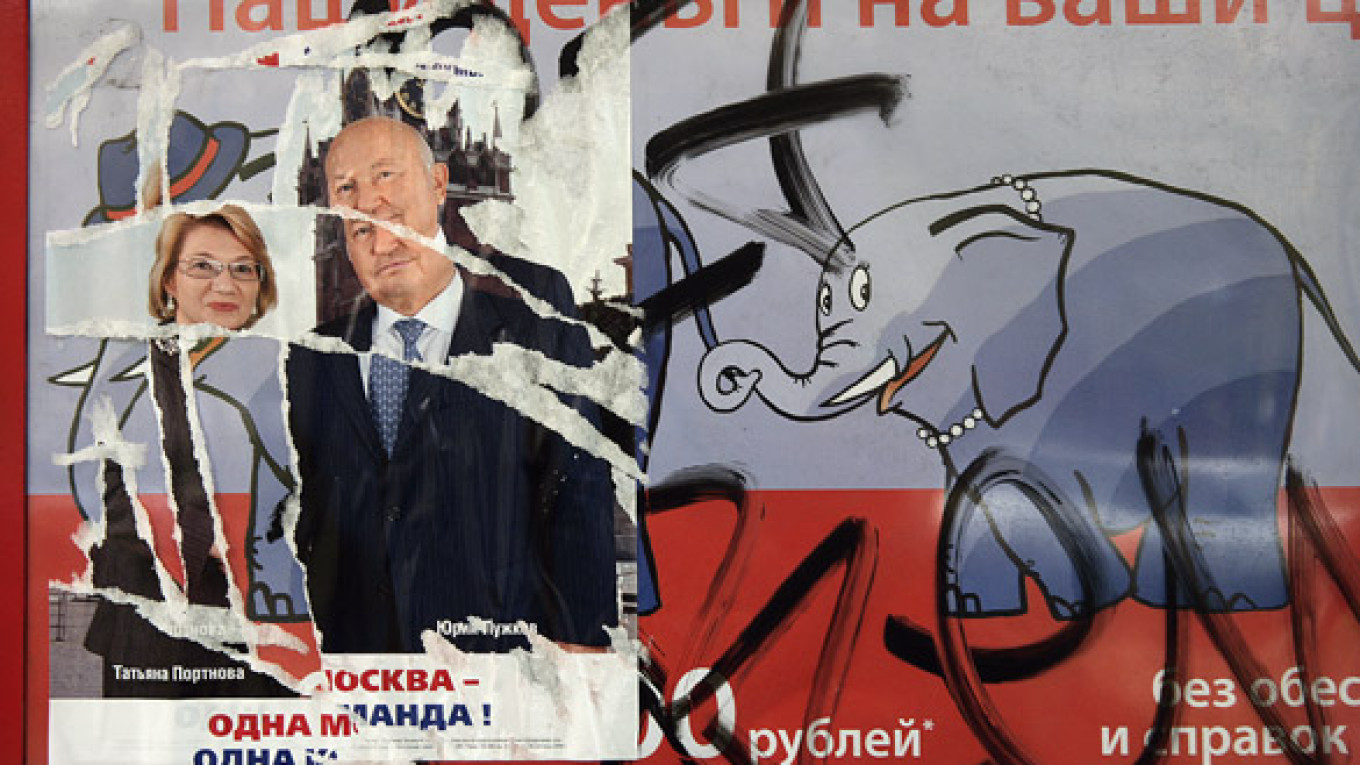Weekend elections swept by United Russia brought to light a new dilemma for some regional bosses: how to deliver strong results for the pro-Kremlin party without causing a scandal.
Mayor Yury Luzhkov and Dagestani President Mukhu Aliyev found themselves in the hot seat Monday after the opposition and even senior officials claimed massive fraud in Moscow and police resorted to violence to prevent residents from voting in the Dagestani city of Derbent.
Luzhkov faced a tall order going into the elections. The Kremlin had urged him in August not to obstruct opposition parties from running for the City Duma. But at the same time, the Kremlin had made it clear that the careers of regional bosses were linked to how United Russia fared at the ballot box.
Last year, Stavropol Governor Alexander Chernogorov was removed from his post after A Just Russia beat United Russia in a vote for the regional legislature. This year, Murmansk Governor Yury Yevdokimov lost his job after United Russia’s candidate wasn’t elected as mayor of the city of Murmansk, and the head of the Yamalo-Nenets Autonomous District, Valery Potapenko, was fired after United Russia scored less than 49 percent in regional elections.
So Luzhkov was rightfully gleeful when United Russia swept 66 percent of the Moscow vote Sunday, increasing its presence to 32 seats in the 35-seat City Duma, up from 29 before. It lost three seats to the Communists.
“I am considered one of the founders of United Russia in Moscow, and it is leading,” Luzhkov told a news conference Monday, RIA-Novosti reported.
He noted that the party had garnered about 48 percent in the last City Duma elections in 2005, and touted Sunday’s win as evidence that he would not be leaving his job any time soon, despite persistent rumors to the contrary.
“Cut this talk. I don’t have any intention to leave,” Luzhkov said.
President Dmitry Medvedev endorsed the elections Monday, but his spokeswoman indicated that the Kremlin was not altogether happy with Luzhkov. “Moscow authorities are not ready to live under new standards. … We will continue encouraging them,” Natalya Timakova told reporters Sunday night, Reuters reported.
Yabloko, the Communist Party and independent election observers spoke of multiple violations during the Moscow elections, including pressure on people to vote for United Russia, the improper use of administrative resources, and the misuse of absentee ballots.
Some Moscow ballot boxes were equipped with scanning devices that fed results directly to the Central Elections Commission’s online database, and even results posted on the commission’s web site raised questions about whether the vote had been manipulated.
For example, Polling Station No. 3,209 in southeastern Moscow reported that 100 percent of registered voters had cast ballots by 4 p.m., itself a huge departure from the city’s overall reported turnout of nearly 35 percent. Two hours later, the station reported that 97.78 percent of registered voters in its district had cast ballots.
At Polling Station No. 3,296 in northwestern Moscow, 100 percent of registered voters had voted by 10 a.m. Four hours later, the station registered only 96.3 percent.
Also, many small districts where less than 100 voters are registered showed zero support for opposition parties and more than 90 percent of the vote for United Russia.
Election officials would not immediately comment on the figures.
In Derbent, where incumbent Mayor Felix Kaziakhmedov, backed by United Russia and the Dagestani president, ran against former Dagestani chief prosecutor Imam Yaraliyev, OMON riot police officers reportedly used tear gas and even shot at voters, wounding one, to prevent them from entering polling stations.
Central Elections Commission chief Vladimir Churov said only 23 of the city’s 36 polling stations were opened after some election officials were attacked and intimidated by unidentified assailants. Kommersant reported Monday that election officials were trying to bar Yaraliyev’s supporters from voting.
Earlier this month, local authorities opened a criminal investigation into Yaraliyev on libel charges, based on a complaint filed by a local officer of the Federal Security Service.
Also, 75 Derbent police officers wrote an open letter to Dagestan’s top police official on Oct. 5, saying they were being pressured by their superiors to vote for Kaziakhmedov.
Derbent election officials said Monday that Kaziakhmedov easily won re-election.
Dagestani President Aliyev’s term expires in February. Medvedev has not given any indication whether he will reappoint him to another term.
A Message from The Moscow Times:
Dear readers,
We are facing unprecedented challenges. Russia's Prosecutor General's Office has designated The Moscow Times as an "undesirable" organization, criminalizing our work and putting our staff at risk of prosecution. This follows our earlier unjust labeling as a "foreign agent."
These actions are direct attempts to silence independent journalism in Russia. The authorities claim our work "discredits the decisions of the Russian leadership." We see things differently: we strive to provide accurate, unbiased reporting on Russia.
We, the journalists of The Moscow Times, refuse to be silenced. But to continue our work, we need your help.
Your support, no matter how small, makes a world of difference. If you can, please support us monthly starting from just $2. It's quick to set up, and every contribution makes a significant impact.
By supporting The Moscow Times, you're defending open, independent journalism in the face of repression. Thank you for standing with us.
Remind me later.


